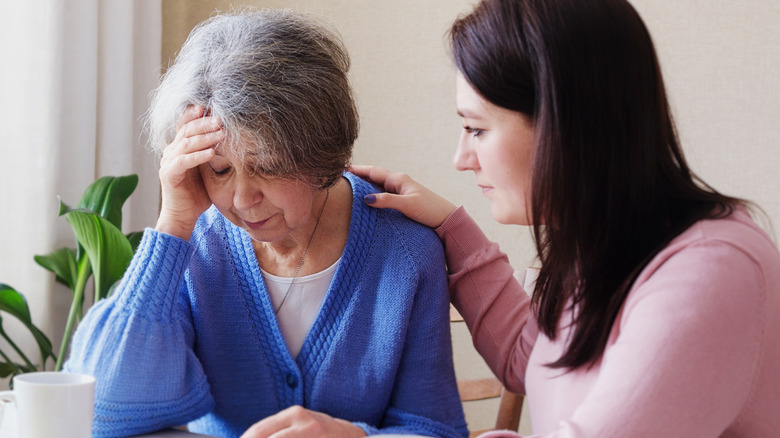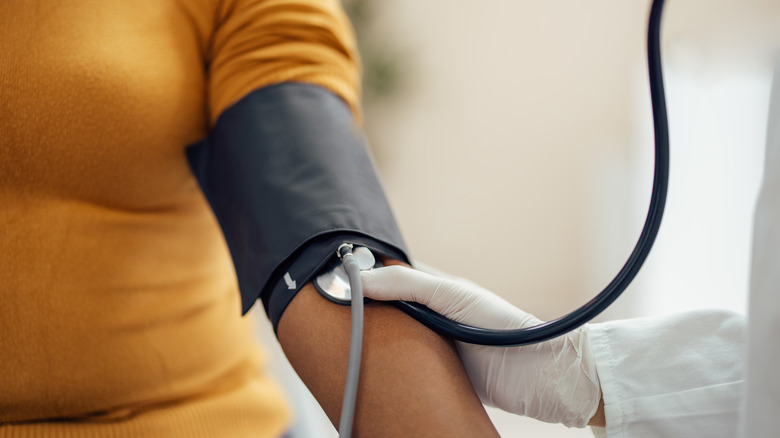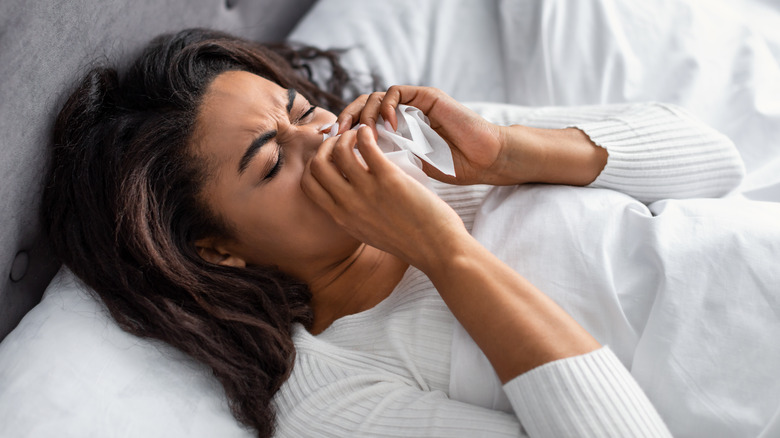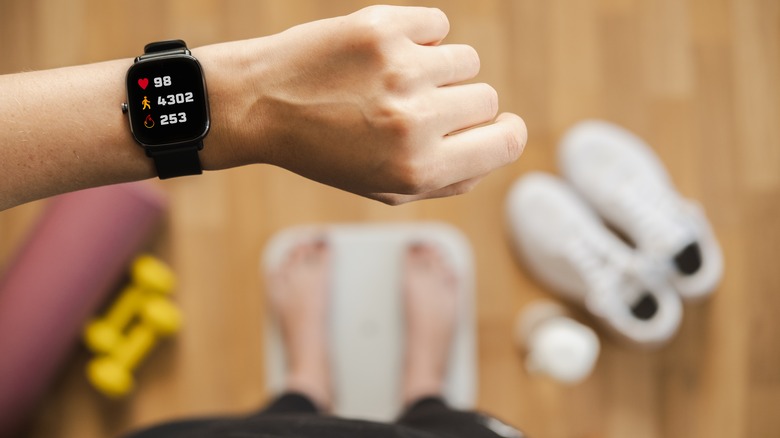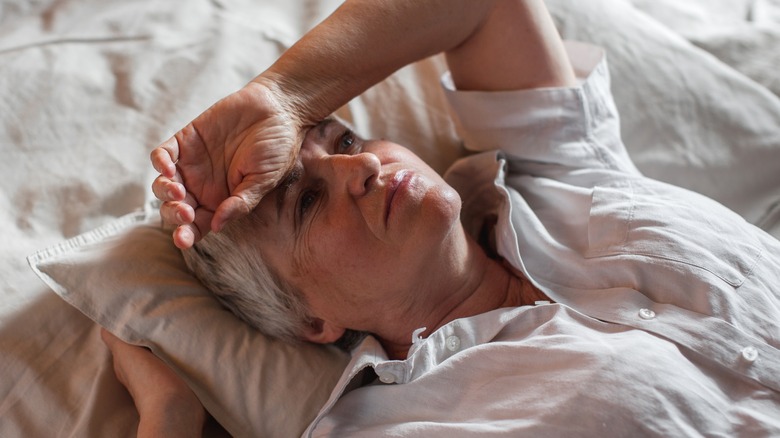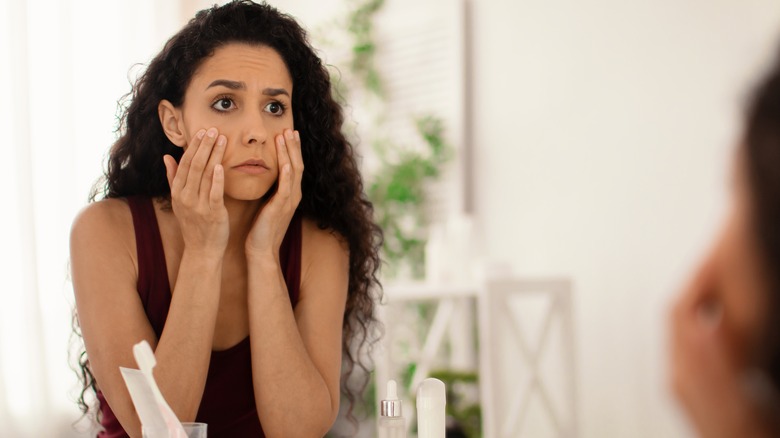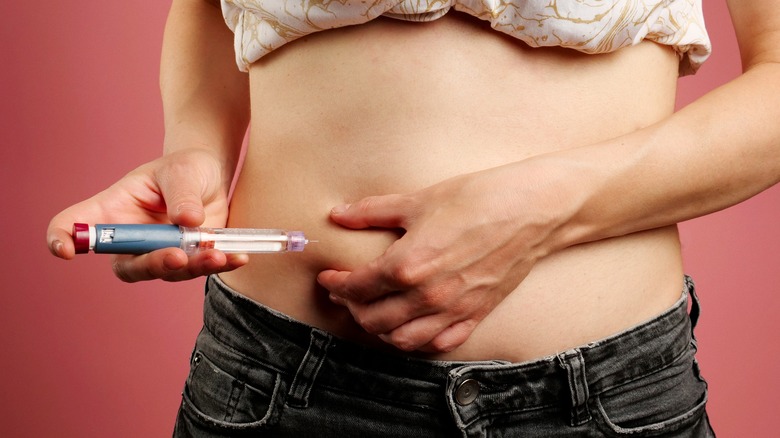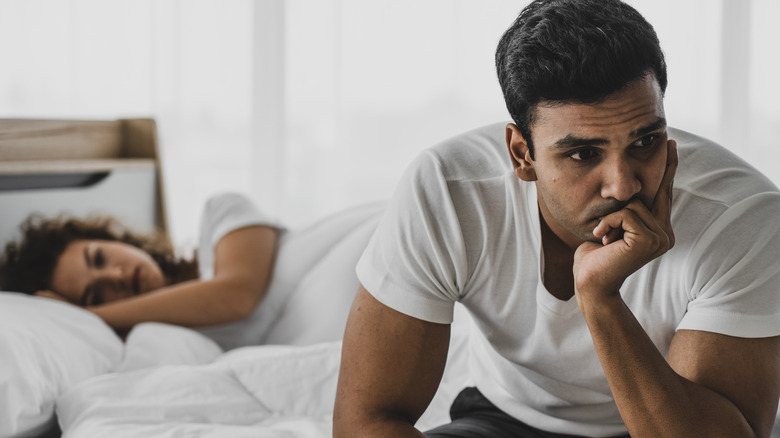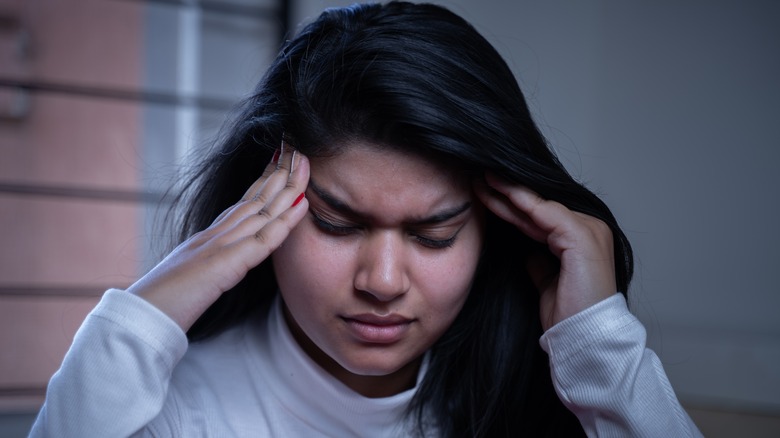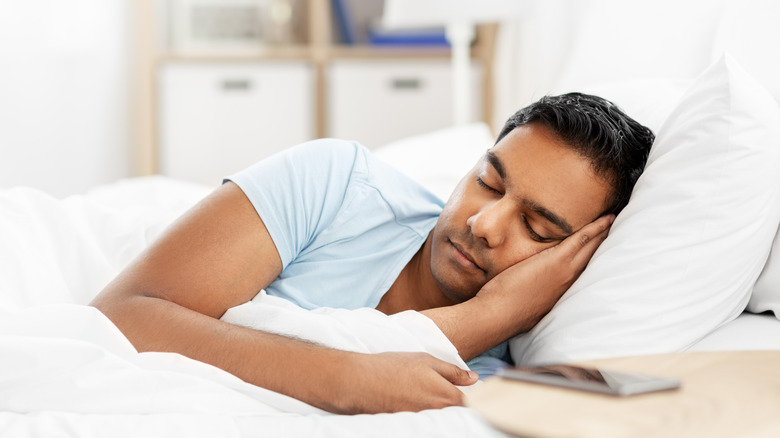What Happens To Your Body When You Just Can't Fall Asleep?
We've all experienced those restless nights filled with tossing and turning, whether due to stress and anxiety, lifestyle choices, or a sleep disorder. There are also the dreaded nights of interrupted sleep, thanks to a wakeful newborn or a snoring partner. Not getting enough quality sleep at night can lead to sleep deprivation and have you feeling miserable and groggy all of the next day. But if you're regularly struggling to get enough sleep, there might be more to be concerned about.
There are several natural hacks that can help you get a good night's rest, and many lifestyle changes you can make (like cutting off your caffeine intake at least six hours before you plan to go to sleep, according to a 2013 study), but there are times where these don't do the trick. If you suffer from insomnia, you're probably well accustomed to the struggles the following day can bring; trouble concentrating, moodiness, puffy eyes, and more. This is because your body needs consistent, high-quality rest, probably more than you realize. Sleep deprivation can actually cause serious issues beyond irritability and the need for an extra strong coffee in the morning.
Your brain function suffers
If you've lost out on an hour or two of sleep, you might feel sleepy or sluggish the next day and find that your brain struggles to wake up. You might also find that a lack of sleep can majorly impact your memory, thought process, concentration, and mood. When you're sleep deprived, your brain hasn't had the necessary time to recharge, as well as go through the process of breaking down the information you've absorbed throughout the day and making it part of your short-term memory (via WebMD). Because of this, your tired brain's lack of concentration and focus makes it difficult to retain information, perform your job well, or even make sound judgment calls.
If this wasn't enough to put you in a bad mood, sleep deprivation can also make your emotions act up. Studies suggest that when you're tired, your brain struggles to regulate negative moods, leading to irritability, anger, and a stronger likelihood of developing depression or other mental illnesses (via Psychology Today). Over time, the impact your lack of sleep has on your emotions can affect your mental well-being and ability to maintain positive relationships, so getting a solid seven to nine hours of restful slumber is crucial.
Your cognitive processing slows
You might have noticed you're a little extra clumsy when sleepy. Sleep deprivation has also been linked to poor cognitive abilities because of your brain's inability to successfully process information when it's tired. When you're tired, your slowed cognitive processing can include diminished alertness, slower reaction times, struggles with motor control or balance, and ultimately you can become more accident-prone. You might even have microsleeps, where your brain forces you to nod off for short periods (via Sleep Foundation). This might not sound too big of a deal, but it could be deadly if your job has any hazards involved. Studies show tired employees are 70% more likely to be involved in an accident at the workplace (via Sleep Disorders and Sleep Deprivation: An Unmet Public Health Problem).
A study by the AAA Foundation for Traffic Safety showed a staggering statistic, reporting that sleeping less than four hours a night can make you as impaired as someone with a 0.12 – 0.15 blood alcohol content (nearly double the legal driving limit in the state of California). So, aside from the potential spilled drinks and stubbed toes you might get with an unrested brain, it can be argued that enough sleep is key to keeping yourself and others safe.
Your risk for developing Alzheimer's disease increases
Insufficient sleep can significantly mess with your brain, but this happens in more ways than short-term effects. The amount of sleep you get can directly impact your likelihood of developing dementia and Alzheimer's disease later in life. A 2021 study analyzed participants aged 50 to 70 and linked a stronger chance of dementia occurring when less than seven hours of sleep were had per night.
While this research was inconclusive about how sleep patterns earlier in life can affect your likelihood of developing neurodegenerative disorders, more studies have pointed out that sleep deprivation can create more beta-amyloid in the brain, which is the protein associated with Alzheimer's disease. Several nights of lost sleep could lead to a build-up of this protein, which is a double-edged sword because beta-amyloid may also make it harder to fall asleep (via National Institutes of Health). The research around Alzheimer's disease has accelerated over the last several years, but because it's such a complicated disorder, there's still more to be done. One thing's for sure, though; if there's one motivation for you to put down your phone and go to sleep; it's to keep your brain healthy.
Your blood pressure can spike
It's not always smoking and a high-sodium diet that are responsible for high blood pressure levels (although they have their part to play). A lack of sleep can also be to blame, according to a 2019 study that assessed blood pressure readings in correlation with sleep efficiency and length. The research indicated that those who didn't sleep well or for very long often had higher blood pressure than usual the following day.
Most experts believe the main reason this happens is down to cortisol (the stress hormone). Cortisol is regulated with sleep, so sleep disturbances can lead to your body struggling to manage your stress levels. With high stress levels comes an increase in blood pressure, and ironically, cortisol can also disrupt your sleep, bringing the entire issue full circle. Why is this a concern? High blood pressure can make you more susceptible to hypertension, stroke, and other maladies that can seriously impact your health. For some, high blood pressure at night might be an indicator of certain sleep disorders or other issues that a doctor should monitor. All in all, if you're not getting enough sleep and have a genetic predisposition toward high blood pressure, it might be a good idea to seek medical advice (via The Sleep Doctor).
Your immune system weakens
Your immune system is responsible for keeping you healthy, fighting off infections, and healing your wounds, but it can't do this properly without rest. When you're sick, your immune system sends an inflammatory response that helps fight off infection and heal, and this response is regulated by cytokines, which are produced while you sleep. Because sleep deprivation exhausts your body, it weakens your immune system's ability to protect you, and not just from sickness. A lack of sleep can also leave you more susceptible to allergy attacks and adverse reactions to vaccines (via Sleep Foundation).
A 2021 study noted that the immune system also utilizes hormones like melatonin and the brain to fight off infections — and we already know how useless our minds are rendered when they're tired. The study notes that those who sleep less than seven hours a night (with seven to nine hours being dubbed as the most beneficial) are more likely to catch a cold, flu, gastroenteritis, or other illnesses. Missing sleep can make you feel lousy enough, so the last thing you'll want to add to the mix is sickness, so keep your immune system happy and working hard by getting the recommended hours of sleep.
Your metabolism slows down
Sleep is fundamental to so many of your body's processes, and missing a few hours essentially skews everything from your head to your toes. Another one of sleep deprivation's effects is that it can also slow down your metabolism, which may cause you to gain weight. A 2010 study examined the relationship between sleep and metabolism, with results pointing out that without sufficient rest, your glucose, leptin, and ghrelin (hormones that regulate metabolism) levels can be thrown off. This makes your body process energy at a different level than you would when sufficiently rested, often slowing the rate at which you burn calories.
In addition to a slower metabolism, exhaustion can significantly influence potential weight gain. Higher levels of ghrelin (your "hunger" hormone) are produced when you lose sleep, so you're much more likely to eat when you're not actually hungry (via Brigham Health Hub). You're probably more inclined to skip the gym following poor sleep, which won't help your metabolism recover.
Another factor to remember is the increased association of depression with sleep deprivation, which can affect your metabolism due to eating habits and activity levels. Exercising regularly and eating healthy foods can help you maintain a healthy sleep schedule, so if you're concerned about your metabolism, there are even more reasons to hit the gym (via Sleep Foundation).
Your hormones can become imbalanced
Hormones make a serious impact on our bodies and how well they operate. Believe it or not, over 50 hormones have been identified in the human body, each with an important role to play (via Cleveland Clinic). The circadian rhythm (your sleep-wake cycle) promotes hormones your body needs to function correctly, including cortisol, estrogen, progesterone, insulin, leptin, ghrelin, melatonin, thyroid hormones, and growth hormones.
When sleeplessness disrupts these chemicals and their processes, stress levels can increase, fertility can be impacted, your body may struggle to process energy and more. Even getting the sleep you need can become more difficult, as melatonin levels (which dictate your body's sleep cycle) can be thrown out of whack without sufficient rest (via Healthline). Other factors like your age, medical condition, or medications can also impact this. If you and your partner struggle to conceive, you feel more stressed out or moody than usual, or you've put on a few extra pounds, sleep deprivation may alter your hormone levels. Ask yourself: Am I getting enough sleep?
Your skin ages prematurely
You can easily tell when someone hasn't slept well just by looking at them — and for good reason. Aside from a glazed-over, zombified facial expression, bloodshot eyes, swollen eyelids, dark circles, and puffiness are all telltale signs of sleep deprivation. Although these characteristics usually go away with some Zs, regularly missing sleep can age your skin at an alarming rate.
Only one night of poor sleep causes a breakdown of cells, leading to uneven skin pigmentation, puffiness, dehydration, a greater appearance of fine lines, and loss of skin elasticity. Over time, this can cause premature wrinkles, making you appear older than you are. Additionally, sleep deprivation can cause your skin to become weaker and unable to repair itself by promoting collagen growth at the rate it once used to (via Science Daily).
A 2015 study even reported that participants who slept well had more resilient skin and positive feelings toward their own attractiveness, whereas those who slept less had weaker skin and lower opinions of their looks. While there are a million tips and tricks to get healthy, glowing skin out there, the number one step should always be to start with a solid night's rest.
Your risk for developing type 2 diabetes increases
Yet another concerning effect a lack of sleep can have on your body is the increased risk of developing type 2 diabetes. When you're asleep, your circadian rhythm naturally raises your blood sugar levels — but this isn't a bad thing, as these levels often rise and dip throughout the day. The worry comes down to your sleep-deprived body developing glucose intolerance and insulin resistance, usually due to an improper hormone balance. This combination can raise your blood sugar and make you more susceptible to developing prediabetes, type 2 diabetes, or other blood sugar disorders (via Sleep Foundation).
Studies have shown that those who didn't sleep enough were 40% more likely to develop diabetes than people who got at least seven hours of sleep. This has even been documented in otherwise perfectly healthy people who don't pose other risk factors. And, if you already have diabetes, there's more bad news; A poor sleeping schedule can worsen your condition. By getting enough sleep and avoiding midnight snacking, you're more likely to maintain healthy blood sugar levels (via National Institute of Diabetes and Digestive and Kidney Diseases).
Your libido goes out the window
Aside from the sleepiness and grumpiness caused by a missed slumber being a complete mood killer, sleep deprivation can alter how your body responds during sex. In men, testosterone is produced during sleep, promoting sex drive and a healthy sperm count. Without enough testosterone, a man can suffer decreased libido, sexual performance, and erectile dysfunction (via Anchorage Sleep Center). Aside from making sex a little bit awkward, it can also majorly impact his self-esteem.
In women, sexual desire and the ability to orgasm have been directly linked to the amount and quality of sleep in a 2015 study. It was concluded that women who slept longer had a 14% higher chance of engaging in sexual activity the following day.
While hormone imbalances due to sleeplessness can affect your libido, there are many other factors to consider. Negative moods, poor judgment, decreased coordination, and increased stress impacting you the day after a restless night can all be equally off-putting when trying to get into the mood. Of course, sex can help you sleep well too, thanks to an increase in oxytocin and a reduction of cortisol, per Sleep Foundation. If you can get through the clumsy exhaustion, it might be a good method to get back into a healthy sleep routine.
You can develop serious brain damage
Don't freak out — one night of tossing and turning probably won't do any serious harm. However, a prolonged lack of sleep can lead to a significant loss of neurons, which can, in turn, cause potentially irreversible brain damage. A 2014 study has changed how scientists view sleep deprivation's impact, examining how the brain cells in mice can be injured and lost without sufficient sleep. After restricting the sleep of these mice, research showed that cognitive function was still significantly impacted after an entire year of "recovery sleep," and an entire 25% of the brains' neurons were lost.
Experts used to believe you could "catch up" on your sleep, but it's now clear that as hard as you may try, you'll never get it back. While more research is still needed, this study truly highlighted how the need for consistent, high-quality sleep has never been more important. So, if for no other reasons than feeling your best, avoiding disease and illness, and potentially damaging your brain, choose to get to bed early; the sleep you lose is unfortunately gone for good.
How to finally fall asleep
Now that you know what your body goes through when you can't fall asleep, it's time to do something to diminish those wakeful nights.
First things first: Get yourself into a good routine. Going to sleep and waking up simultaneously every day helps your natural sleep-wake cycle adjust, which will help you feel sleepy when it's time for bed. In addition, avoiding screen time too close to your bedtime will help with melatonin production, as the blue light from your phone, TV, laptop, and tablet can disrupt your brain's natural inclination to feel sleepy (via Sleep Foundation). Instead, opt for meditation, reading, a bath, or listening to music to prepare for a good night's rest.
You can also do several things throughout the day that can benefit your ability to sleep later on. Limiting your caffeine intake is a big one — a 2022 study has noted that it can take five hours for the stimulating effects of caffeine to wear off, so it's a good idea to cut out coffee and energy drinks before the late afternoon. Regular exercise, avoiding large meals right before bed, and limiting your alcohol consumption can all contribute to solid sleep. You can make several lifestyle changes to get you into hibernation mode quickly, and if they fail, it might be time to consult a professional for help.



